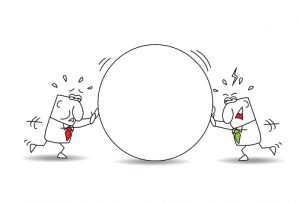The idea of implementing anonymous peer reviews, and the whole notion that it would be beneficial to students in terms of improving team dynamic and efficiency did not sit easy with me. In fact, I believe it does the opposite of that. The way I view anonymous peer evaluations can be modelled by a soccer ball not only missing its goal but backfiring and scoring on its own goal. Of course, having anonymity in evaluating your peers has its ups, I am not denying that, however, when looking at the bigger picture, having anonymous peer evaluations simply is counter intuitive to the whole entire point of providing students the path to the most efficient, most authentic team experience possible.
First off, I do agree that in some respects, anonymous peer evaluations can be beneficial when it comes to working in a team. As stated in Class 2, anonymous peer reviews are a counter-measure to things such as social loafing, where certain individuals would put more energy into non-work related during important times such as team meetings. It also allows evaluators (professors) to get an accurate evaluation, as members wouldn’t be afraid of any social backlash or awkwardness. In these cases, anonymous peer evaluations certainly do their job.

Visual interpretation of two team member struggling to one up another
http://media.istockphoto.com/vectors/every-man-for-himself-vector-id534305796?k=6&m=534305796&s=170667a&w=0&h=_rVjw6lrUaAsSGZ_w03rG_vEBCa5P1ydVufIuf4JT3g=
Now, here is why I believe that the stated intentions of the anonymous peer evaluations backfires completely. Defined in class 2, a team is ‘’ [a] small number of members with a mutual goal, [that acts] as cohesive unit’’. If a team cannot be cohesive then they simply won’t work as a team. However, when putting the pressure on each member to perform to get a good evaluation from their peers a ‘me vs. them’ mentality begins to formulate. Instead of each individual focusing on the well-being and efficiently of the team, they are more inclined to focus on themselves in order to achieve the highest mark on their evaluations that they can. This alone puts a strong obstacle on the goal to be cohesive as the team is already provided the foundation to be divided. In addition, with the evaluation in mind, group members are more oppressed in what they choose to say. They may begin to think ‘’ if I openly critique him/her, I’ll receive a lower mark ‘’. In class 10 on Performance Management, we were told how valuable good criticism is, yet again, the anonymous peer evaluation proves to be a worthy obstacle in achieving something that is heavily encouraged and proven to be effective.
To sum it up, anonymous peer evaluations do not improve the dynamic or efficiency of the team by providing an obstacle for teams to become an cohesive unit.